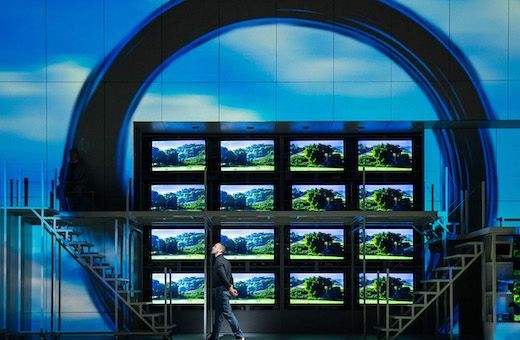The (R)evolution of Steve Jobs is, I dare to say, the most brilliantly compelling contemporary opera I’ve been privileged to see. Its one uninterrupted act, lasting 95 minutes, is fragmented into seventeen scenes, anchored by prologue and epilogue, each paced to perfection to reflect Jobs’s, and indeed our own, insatiable twitchiness, our technology-enhanced (exacerbated?) hyperactivity and attention deficits, our yearning for something beyond and away from the technologies which are as intimate to us as our selves. It’s an opera for an online audience: we are told to turn off our devices for the duration, and we do, just about.

I did have niggling doubts about what to expect before this performance at the Lyric Opera of Kansas City. A selective luddite, I’ve always been spiritually uneasy with the technologies I live by, and only recently ditched a flip phone in favor of the cheapest iPhone I could find (as if spending less could salvage my conscience about electronic encroachment). An opera about Jobs smacked of clever corporate greyness, to my mind, too much silicon sleekness. iOpera? Surely the theatre was our last refuge from the tentacles of our technologies.
Mark Campbell’s creation, expressed musically in Mason Bates’ extraordinary scoring, shook me completely. One hesitates to apply the word ‘meditation’ to a production so kaleidoscopic, so much an illustration of our own distractedness, our own twitchy technological addictions, but even so, it surely served as a profound meditation on our contemporary condition. If, in the Shakespearean tradition, art holds a ‘mirror up to nature’, this opera held a mirror up to our transformation of nature, through our technology, and yet, ultimately, its resistance to that very transformation. Only one thing in life is certain, the Buddhist Kōbun reminds Jobs and us early on. The word death is eloquently unsung at that point, but hangs in the air, the death that comes to Jobs prematurely, that will come to us all sooner or later.
Such operatic truth-telling sounds very somber, which, given its pace, it couldn’t altogether be. Perhaps that is the nature of the iAge – nothing is anything for very long; there is always something else, another development, achievement, outrage, tragedy. Where’s the permanence, the still center, the simplicity? Jobs, played powerfully and fitfully by baritone John Moore was ‘lost’ enough to seek this, to come, painfully, to know his need. Vaulting ambition began so innocently in the family garage – a fine place to start – with endearing scenes of hippie inventiveness as the two Steves, (friend Woz played by Bille Bruley), voiced their anti-establishment counter-cultural vision, with musical nods towards Bob Dylan.
American dreams may start in garages, but they are always about the next thing, and we watch with discomfort as common man becomes corporate Nazi becomes consecrated god of the new order: the obsessive aesthetic purism conveyed in his tightly rhythmic, repetitive imperatives – “One device, all you need”, “all wrong” screams to his corporate-pawns, and most darkly of all, “Get rid of it” directed at his lover’s unborn daughter. A true Greek chorus commented, suffered, worshipped, judged him.
Wei Wu, in the role of Jobs’s guru, Kōbun, was a great ballast in the work – vocally, with his richly impressive bass, and in every other way too – a presence that sought to ground Jobs, spiritually and humanly, to bring light from his crippling personal darkness, but also to add touches of wry comedy, pleasing antidote to Jobs’ shatteringly serious sense of the importance of his work and mission, all too narrowly conceived. Wife Laurene, in Sarah Larsen’s luxuriant soprano, was another figure lovingly recalling Jobs to himself, reminding him that he was not one of his machines, that the very obsession with aesthetic perfection merely hid, for a time, the jumbled wires beneath, the vulnerability of the failing body.
Jacob Climer’s sets, Robert Wierzel’s lighting, and S. Katy Tucker and Blake Manns’s projection designs on 28 ever-changing screens were not just an accompaniment in Tomer Zvulun's production, but in a very real sense, the message: what is it to live and breathe in the glare of screens? When Jobs tries to get away, to rest, scenes of sky and green are merely projected: is there any escape? Bates’ score was sensational – I mean in its original sense: it had all the hyper-alertness of an animal never relaxing – the relentless pace, the staccato, the polyrhythms, the noises of electronica. There was a whole meta reflection on music too, as Jobs hoped that our devices would be something we would play, not something that would play on us, and so back to the carefree Dylanesque garage. “How many times must a man look up / Before he can see the sky?”
The end feels authentically humane, and somehow transcends cliché, despite conventional turns of phrase, as the backdrop opens into the screenless light of possibility, Gatsby’s orgiastic future, perhaps, that year by year recedes before us. And one fine morning…


